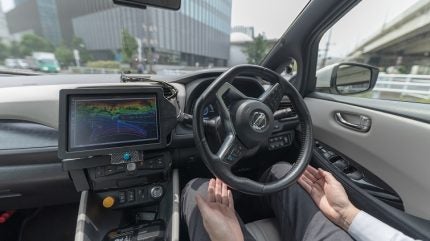
Nissan Motor said it had begun trials of a prototype vehicle equipped with its in house developed autonomous driving technology ahead of plans to launch commercial services.
The self driving Leaf prototype has 14 cameras, 10 radars and 6 Lidar sensors which, Nissan said, demonstrated its “progress in the field of autonomous driving, particularly within complex urban environments”.

Discover B2B Marketing That Performs
Combine business intelligence and editorial excellence to reach engaged professionals across 36 leading media platforms.
Compared to earlier prototypes, this latest test vehicle was said to feature “an array of roof mounted sensors, significantly expanding the detection area and enabling more accurate detection of its surroundings”.
The company said its latest self-driving prototype had enhanced recognition performance, behavioural prediction plus judgment and control functions, allowing it to deliver a “smooth operation in a variety of complex scenarios”.
The trials are taking place on the busy streets of Yokohama, close to the company’s global headquarters, where Nissan said the Leaf was able to “smoothly demonstrate its ability to predict the behaviour of pedestrians, conduct lane changes when merging and judge when to safely enter intersections”.
The automaker added it had been studying business models for future mobility services since 2017.
While the current demonstration was being conducted at SAE Level 2 equivalent with a safety driver on board, the company planned to continue to “expand functionality” and to begin offering autonomous driving mobility services in Japan from the 2027 fiscal year by working with third parties such as local authorities and transport operators.
Nissan planned to expand the trial area to include Minato Mirai in the first quarter of 2025 and aimed to progress to service demonstration tests within the 2025/26 fiscal year. During the trials, the level of autonomous driving functionality would be gradually increased while assessing customer acceptance, with the aim of providing full driverless services.
Nissan said in a statement its “long term vision is to empower mobility by solving transportation service issues faced by local communities. Local communities, particularly within Japan, have been facing several mobility challenges such as driver shortages which are a result of an ageing population. Supporting a resolution to this challenge, [we] will provide a broad range of new services that enable free movement”.






